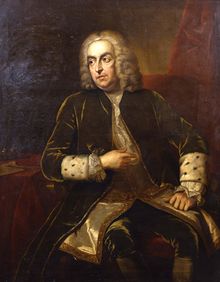William Pulteney, 1st Earl of Bath
|
The Right Honourable The Earl of Bath PC |
|
|---|---|

The Earl of Bath in the 1740s.
|
|
| Secretary at War | |
|
In office 1714–1717 |
|
| Monarch | George I |
| Preceded by | Francis Gwyn |
| Succeeded by | James Craggs the Younger |
William Pulteney, 1st Earl of Bath, PC (22 March 1684 – 7 July 1764) was an English politician, a Whig, created the first Earl of Bath in 1742 by King George II; he is sometimes stated to have been Prime Minister, for the shortest term ever (two days), though most modern sources reckon that he cannot be considered to have held the office.
The son of William Pulteney by his first wife, Mary Floyd, he was born in March 1684 into an old Leicestershire family. He was educated at Westminster School and at Christ Church, Oxford, matriculating on 31 October 1700. He acquired extensive classical knowledge, and on leaving Oxford made the usual tour on the continent. In 1705, he was brought into parliament by Henry Guy (former secretary of the Treasury) for the Yorkshire borough of Hedon. This seat was held by him without a break until 1734.
Throughout the reign of Queen Anne William Pulteney played a prominent part in the struggles of the Whigs, and was involved in the prosecution of Henry Sacheverell. When the victorious Tories sent his friend Robert Walpole to the Tower of London in 1712, Pulteney championed his cause in the House of Commons and with the leading Whigs visited him in prison.
Pulteney was secretary of war from 1714 to 1717 in the first ministry of George I, and was on the committee of secrecy on the Treaty of Utrecht, formed in April 1715. Two years later, on 6 July 1716, he became one of the privy council. When Townshend was dismissed, in April 1717, from his post of Lord Lieutenant of Ireland, and Walpole resigned, they were followed in their retirement by Pulteney. The crash of the South Sea Company restored Walpole to the highest position, but all he offered to Pulteney was a peerage. The offer was rejected, but in May 1723 Pulteney agreed to accept the lucrative but insignificant post of Cofferer of the Household. However, when he found himself neglected, he opposed the proposition of Walpole to discharge the debts of the civil list, and in April 1725 was dismissed from his sinecure.
...
Wikipedia
